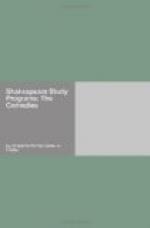QUERIES FOR DISCUSSION
Is the inconsistency of the last three scenes misleading and puzzling rather than alluring to the curiosity of the reader?
Could it be made more interesting on the stage by the way of enacting the part of Brother Anthony?
ACT II
THE PRINCE PLOTS FOR TRUE NOTING AND HIS BROTHER FOR FALSE
Tell the story of the masked ball. What new light is thrown, first, on the characters and, then, on the plot by means of these fragmentary bits of dialogue heard as the revellers pass on and off stage together.
Is Don John really misled as to his Brother’s intentions toward Hero?
What does Hero herself think?
Does Don Pedro himself show that he is acting for another—that the god, Love, dwells beneath his visor? The modernized edition spoils one of the references to this office in which the Prince labors for Love and does a labor of love in whose disinterestedness some doubt is expressed. By changing Love to Jove (in II, i, 92) a literal correction is made in accord with the legend referred to, but in entire destruction of the point made by the Prince, if Shakespeare means to adapt the allusion to his special purpose. Note also Benedicke’s name for Claudio (II, iii, 34). What is your opinion of this? (See Note on II, i, 91, in “First Folio Edition"). Compare another instance where the Prince shows that he is acting for Cupid (II, i, 358-367). Is Don Pedro the most active spirit in the plot? Show how in Acts I and II, it is made clear that the plot will consist in the prevalence of either a favorable or unfavorable influence upon the happiness of the characters. Who represents each influence?
Notice that the favorable influence in its first action in favor of Claudio’s happiness is misunderstood, discounted and disbelieved in several directions. Is Claudio led to distrust of the Prince by others or by his own jealousy?
In the second action of the favorable influence initiated by the Prince, which of the characters share? Does the unfavorable influence work against Benedicke’s happiness?
What is Borachio’s place in the action of the unfavorable influence?
QUERIES FOR DISCUSSION
Noteing or overhearing is itself nothing or has a large element of the deceptive in it. How is it made to work well in Benedicke’s case? Is the element of truth the only one that is effective?
ACT III
THE NOTE-ING IS NOTED
Show that the action taking the Story on consists in the “note-ing” already planned being enacted and being noted as true. How does this work with Beatrice in Scene i?
In Scene ii the unfavorable influence makes its preparation to carry on the plot disastrously by the same method. How is this made clear?




